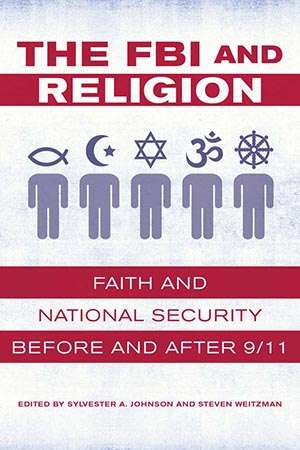God and Man at the FBI
Dissident and offbeat religious groups have faced more than a century of surveillance.
The FBI and Religion: Faith and National Security Before and After 9/11, edited by Sylvester A. Johnson and Steven Weitzman. University of California Press, 376 pages, $29.95

Ever since FBI Director James Comey staggered into the spotlight during last year's presidential campaign, critics have been comparing him to the most infamous man ever to hold Comey's job. "I think this is sort of a flashback to the days of J. Edgar Hoover," the journalist turned academic Sanford Ungar told The New York Times last October. "I don't mean to smear Comey, and it may be an unfair comparison. But Hoover would weigh in on issues without warning or expectation."
Comey's comments about the Hillary Clinton email investigation do highlight how a law enforcement agency can improperly influence public opinion. But there are some pretty big differences between his behavior and that of his predecessor. For one thing, his actions last year were public, a fact that triggered a national debate over their propriety and eventually led the Justice Department's inspector general to launch an investigation of how his agency handled its probe of Hillary Clinton's emails. For another, that probe was a legitimate criminal investigation.
Hoover's FBI, by contrast, secretly monitored the non-criminal personal and political conduct of U.S. citizens. Among them: first lady Eleanor Roosevelt, Presidents Dwight Eisenhower and John Kennedy, Democratic presidential nominee Adlai Stevenson, civil rights leader Martin Luther King Jr., and syndicated columnist Joseph Alsop. Hoover even ordered his agents to conduct a content analysis of Walt Kelly's comic strip Pogo to ascertain whether one of the strip's animal characters, based on the FBI director, portrayed him in a positive or derogatory light.
The information acquired in these surveillance expeditions was maintained in closed FBI files, and much of it was used to advance Hoover's political agenda through leaks to favored reporters, governors, members of Congress, and the White House—on the strict condition that the recipient not disclose the FBI's assistance.
The scope of Hoover's abuses did not become widely known until the unprecedented hearings conducted by the so-called Church Committee in 1975–76. It has been advanced since then through a mixture of journalism, scholarship, and Freedom of Information Act requests. Now a new book, edited by Sylvester Johnson of Northwestern University and Steven Weitzman of the University of Pennsylvania, adds another dimension to our understanding by recounting the bureau's long history involving religious activists and institutions.
The FBI and Religion contains 15 essays written by theologians, historians, and political scientists; the ground it covers stretches from the bureau's birth during the Progressive Era through the current war on terror. It is based on extensive reading of the secondary literature on the FBI, supplemented at times by research of relevant and accessible FBI records. Most of the chapters focus on the government's surveillance of religious leaders and institutions, with bureau officials often equating moral advocacy of peace or racial justice with threats to the nation's security. Targets include the Church of God in Christ during World War I, the Moorish Science Temple of America from the 1920s through the 1960s, the Nation of Islam and the Southern Christian Leadership Conference during the 1950s and '60s, the Branch Davidians during the Waco siege of 1993, and militant Muslims following 9/11.
Other essays assess how, during Hoover's tenure, FBI officials employed religious rhetoric to influence public attitudes about suspected subversives. (Hoover himself regularly used religious rhetoric in his public speeches and writings, impugning radical activists as "immoral, Godless, and disloyal.") In addition, FBI officials benefited from more conservative religious leaders, such as Carl McIntire, Edward Bundy, and Billy James Hargis—and conservative religious institutions, such as the Council of Christian Laymen and the Church League of America—both to promote that countersubversive rhetoric and to recruit fundamentalist Protestants, Catholics, and Mormons as agents.
The concluding essays in this collection chronicle a significant shift in FBI officials' conceptions of religious militants, in which the bureau came to appreciate the religious basis for millennial "cults" and militant Muslims. The book attributes this to two factors. The first was the more restrictive investigative guidelines instituted after the revelations of the 1970s, which temporarily endorsed a law enforcement standard for domestic security investigations. (These restrictions were loosened after the 9/11 attack.)
The second factor was criticism of the bureau's actions during the siege of the Branch Davidians. In the wake of the Waco controversy, FBI officials started soliciting input from scholars of religion to acquire a more nuanced understanding of both millennialists and Muslims. The agency then modified its conceptions of such groups, and it officially accepted that militant speech did not necessarily indicate an intent to violate the law or to engage in or promote violence. Nonetheless, it continued to monitor such religious groups, perceiving militancy as a possible indicator of future action.
This volume is particularly timely right now, given the debate over government surveillance of militant Muslims and given the Trump administration's proposed restrictions on immigration. Comey may not be another Hoover, but obsessive concerns over religious rhetoric and activism can still undermine core First Amendment values.
